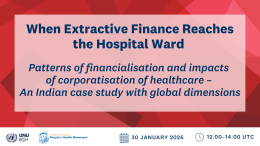A new UNU-CPR policy brief outlines the current policy landscape for preventing modern slavery risks in conflict and crisis settings and examines how these policies address gender, the needs of diverse men, and financial inclusion. The brief reflects recent calls for intersectional approaches to anti-trafficking and anti-slavery data collection, analysis, policy, and programming.
Although there is growing recognition of the role that financial inclusion can play to protect people from modern slavery in conflict and crisis settings, there is very limited information on the intersecting ways in which diverse men – men of varying gender expressions, sexual orientations, ethnicities, ages, and abilities – experience specific risks associated with modern slavery in these contexts.
This policy brief, an output of UNU-CPR’s Finance Against Slavery and Trafficking (FAST) initiative, explores how structural and systemic inequalities and disparities are reinforced during conflicts and crises – and helps identify how humanitarian efforts can best support individuals impacted.
Policy-relevant recommendations include:
- Improve awareness and understanding of gender in anti-trafficking/anti-slavery policy and interventions in conflict and crisis.
- Expand slavery/trafficking prevention policies and programming to include diverse men.
- Consider forms of modern slavery beyond ‘trafficking’ – using trafficking in policies and responses could restrict the effectiveness of interventions in conflict and crisis settings, and addressing broader definitions is crucial for a more comprehensive approach.
- Promote financial inclusion to address vulnerabilities to modern slavery – and increase understanding of the interactions between financial exclusion and modern slavery risks.
- Promote collaboration and identify areas of alignment – fostering shareholder cooperation among government agencies, financial institutions, civil society organizations, and international actors can be coordinated and optimized to address the intersection of fincial inclusion and trafficking effectively.
Read ‘Policy Approaches to Preventing and Reducing Modern Slavery Risks for Diverse Men in Conflict and Crisis through Increased Financial Inclusion’ here.
Suggested citation: Angharad Smith, Leona Vaughn. Preventing and Reducing Modern Slavery Risks for Diverse men in Conflict and Crisis Through Increased Financial Inclusion : UNU-CPR, 2023.



